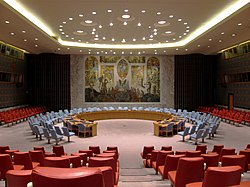Security Council of the United Nations
| مجلس الأمن التابع للأمم المتحدة (Arabic) 联合国安全理事会 (Chinese) Conseil de sécurité des Nations unies (French) Совет Безопасности Организации Объединённых Наций (Russian) Consejo de Seguridad de las Naciones Unidas (Spanish) |
|
 |
|

UN Security Council Chamber in New York City
|
|
| Abbreviation | UNSC |
|---|---|
| Formation | 1945 |
| Type | Principal Organ |
| Legal status | Active |
|
Head
|
Council President |
| Website | un |
Council President
François Delattre
The United Nations Security Council (UNSC) is one of the six principal organs of the United Nations, charged with the maintenance of international peace and security as well as accepting new members to the United Nations and approving any changes to its United Nations Charter. Its powers include the establishment of peacekeeping operations, the establishment of international sanctions, and the authorization of military action through Security Council resolutions; it is the only UN body with the authority to issue binding resolutions to member states. The Security Council held its first session on 17 January 1946.
Like the UN as a whole, the Security Council was created following World War II to address the failings of a previous international organization, the League of Nations, in maintaining world peace. In its early decades, the body was largely paralyzed by the Cold War division between the US and USSR and their respective allies, though it authorized interventions in the Korean War and the Congo Crisis and peacekeeping missions in the Suez Crisis, Cyprus, and West New Guinea. With the collapse of the Soviet Union, UN peacekeeping efforts increased dramatically in scale, and the Security Council authorized major military and peacekeeping missions in Kuwait, Namibia, Cambodia, Bosnia, Rwanda, Somalia, Sudan, and the Democratic Republic of Congo.
...
Wikipedia
